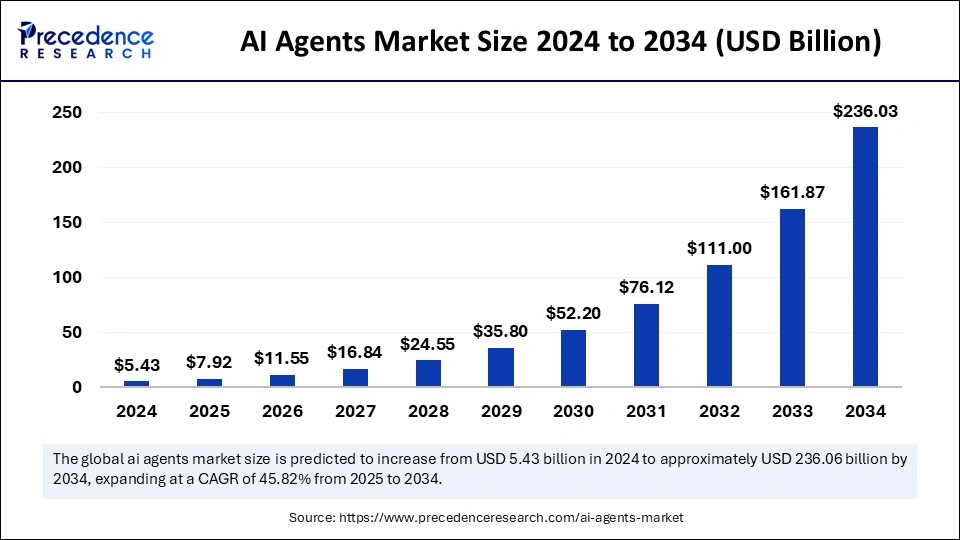In a significant forecast for the tech industry, the global AI agents market is expected to soar from USD 5.43 billion in 2024 to an astounding USD 236.03 billion by 2034. This growth, representing a compound annual growth rate (CAGR) of 45.82%, is primarily fueled by advancements in machine learning (ML) and natural language processing (NLP). North America, a key player in this sector, accounted for USD 2.23 billion in 2024 and is projected to maintain a similar growth trajectory.
The announcement comes amidst a technological revolution, with AI agents increasingly integrated into various sectors such as finance, healthcare, and retail. These agents, which include chatbots and virtual assistants, are designed to perform tasks autonomously, enhancing efficiency and customer engagement.
Driving Forces Behind the AI Agents Market
The rapid advancements in ML and NLP are pivotal in the expansion of the AI agents market. These technologies enable AI agents to perform complex tasks, from problem-solving to interacting with users and environments. The ability of AI agents to learn from past interactions and data further enhances their effectiveness, making them indispensable in today’s digital landscape.
According to industry experts, the demand for business process automation and hyper-personalization is a significant factor propelling market growth. AI agents are increasingly used to provide 24/7 customer support, analyze large datasets, and offer personalized recommendations, which are crucial in sectors like e-commerce and telecom.
“The growing demand for personalized customer service is a key opportunity for AI agents. They can analyze customer data to offer tailored solutions, enhancing customer loyalty and engagement,” said a spokesperson from Precedence Research.
Regional Insights and Market Dynamics
North America currently dominates the AI agents market, holding over 41% of the revenue share in 2024. The region’s well-developed technological infrastructure and robust AI ecosystem contribute significantly to this dominance. Major companies like Amazon, Google, and Microsoft are at the forefront, driving innovation and adoption of AI technologies.
Meanwhile, Asia Pacific is expected to experience the fastest growth during the forecast period. The region’s digital transformation, coupled with substantial investments in AI technologies, is accelerating the adoption of AI agents. Countries like China, Japan, and South Korea are leading this charge, particularly in sectors such as smart cities and healthcare.
Challenges and Limitations
Despite the promising growth, the AI agents market faces several challenges. Ethical and privacy concerns, such as data misuse and lack of transparency, pose significant risks. Additionally, the high operational costs associated with developing and deploying AI agents can be a barrier for smaller enterprises.
“The ethical concerns surrounding AI, including misinformation and privacy issues, need to be addressed to ensure sustainable growth in the market,” industry analysts warn.
Future Outlook and Technological Trends
Looking ahead, the AI agents market is set to benefit from continuous technological enhancements. Innovations in deep learning and NLP are expected to create smarter, more conversational AI agents capable of performing a broader range of tasks autonomously.
In the United States, the AI agents market is projected to grow from USD 2.27 billion in 2025 to USD 69.06 billion by 2034, with a CAGR of 46.09%. This growth is driven by the increasing adoption of AI agents in business automation, improving efficiency and productivity across various sectors.
Globally, the integration of AI agents into enterprise tools and communication channels is becoming increasingly prevalent. Leading platforms such as Microsoft 365 Copilot and IBM WatsonX are embedding AI agents to enhance business operations.
Conclusion
The AI agents market is on the cusp of a transformative decade, with significant growth anticipated across various regions and sectors. As technology continues to evolve, AI agents will play a crucial role in shaping the future of customer service, business automation, and beyond. However, addressing ethical and operational challenges will be essential to harness the full potential of this burgeoning market.
About The Author
 U.S. Oil Prices Drop as Crude and Gasoline Inventories Surge
U.S. Oil Prices Drop as Crude and Gasoline Inventories Surge Trailways Ranks Among Top 3 U.S. Bus Services in USA Today Awards
Trailways Ranks Among Top 3 U.S. Bus Services in USA Today Awards Commercial Banking Transforms with Data-Driven Innovations
Commercial Banking Transforms with Data-Driven Innovations Mattamy Homes Celebrated as Top Workplace in Central Florida for Fifth Year
Mattamy Homes Celebrated as Top Workplace in Central Florida for Fifth Year Tesla Sales Decline Amid Boycott as Competitors Gain Ground
Tesla Sales Decline Amid Boycott as Competitors Gain Ground